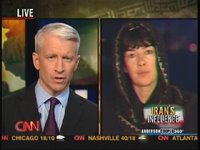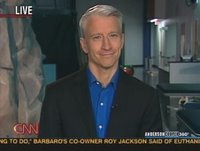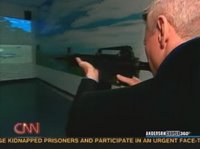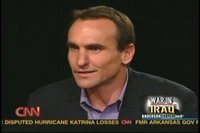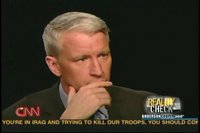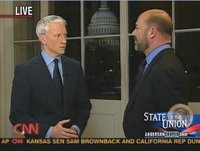The Four Wars In Iraq: An Awesome Michael Ware Interview (Tuesday's Second Hour)
This interview is broken up into four main parts, but first we have a kind of intro where Anderson asks where the war is now. Michael says American commanders think it is in a dire, but not yet hopeless state. However, there has been no progress in any way. Anderson points out that Cheney was recently touting the democratic elections and Michael replies that they were surfaces successes and common Iraqis say they'd rather go back to the old way if this is what we call democracy. Then Michael lays out all the horrors that Iraqis go through that we have all heard before. Michael thinks that this focus on Baghdad comes at a great cost because al Qaeda is becoming stronger in Anbar Province. Anderson notes Anbar is about to get 4,000 more troops and Michael says that's a drop in the bucket. Michael informs us that militias own the south where Iran's influence is greater. He points out that critics may point to the area being stable, but that's only because coalition forces have basically given power to Iran. Michael says the surge is not a new strategy because the "new" tactics have been tried before in other places of the country.
On now to the first war, which is with the Sunni insurgents. Michael explains that by and large this was the war the US expected to fight. The insurgents started out small, but then emerged stronger. Michael says that with the disbandment of the military and economic opportunity taken away (thanks Bremer!) the Sunni's felt dishonored when they were just sent home and the US underestimated this sense of honor. Surprisingly, they weren't actually fighting for the return of Saddam. Nor did they initially support al Qaeda. In fact there was great friction between the groups. However, as the insurgents began to feel strain with finances and in other areas, al Qaeda got stronger to the point that they were able to take over areas. This then leads to Michael's near execution story, which I blogged previously, though I did miss this great quote: "There's so much that we're told by all sides. I mean, this is one of the universal features of this war as in all others, is that everybody lies." The first casualty of war is the truth.
Next up we have the second war, war with al Qaeda. Anderson wants to know what was really happening at the time Bush was primping under his "Mission Accomplished" banner. Michael notes that before the war there was an al Qaeda presense in the country by name of a group called Ansar al-Islam, but they were holed up in the north and were not related to Saddam. Michael was up there at the time with the US Green Berets that were fighting them and they all watched them just hop on over to Iran. They were not wiped out like Bush said. Man, why have we never heard this before? Anyway, then Anderson brings up Zarqawi and Michael notes that the US invasion gave him a battle to join-a battle where he made his name because before that he was nobody. "So in many ways, the invasion played directly into the hands of al Qaeda," Michael says. Lovely. I know I always like to help people who crash planes and knock down buildings. It's like we couldn't have made this worse if we tried. So okay, Zarqawi's whole plan was to make Iraq the new Afghanistan. He wanted to start a war between the Sunni and Shia, so that the Sunnis would wake up from their supposed slumber and then rise up and fight. Well, hey, mission accomplished. If he wasn't dead we could let him borrow Bush's banner. Anderson points out that really, this is a fight against Muslims that aren't radical enough. Michael tells us that al Qaeda has declared western Iraq an Islamic state to be ruled by Sharia law-a country within an American occupation. I tried to think of a little retort to end the segment. I don't have one.
On now to the third war, which is the civil war. So is CNN finally calling it a civil war now? Michael talks a bit about stuff covered in the last segment regarding waking up the Sunnis to fight. Then he mentions that commanders say it's good that the civil war is only in Baghdad, but really that's no success because Baghdad is mixed and a lot of other places aren't. Anderson wants to know if the death squads are controlled by the Iraqi government. "Absolutely," Michael replies. Anderson then asks what Michael does when he gets stop at road blocks run by Iraqis. Michael notes that basically you're always rolling the dice because you have no idea who those people are really going to be. No where is safe-you can even be dragged out of your home. This makes me feel very scared for Michael, but I pretty much was anyway. Anderson notes that the adminstration points to the elections and he wants to know if they have decreased the violence. Michael says no. In fact, the democratic process have fueled the conflict because the Sunnis see the US as entrenching Shia power and that's why ordinary Sunnis are turning towards al Qaeda-they feel they have no other choice. "And the true winners of the war so far of the invasion and the occupation, at the end of the day, are the Islamic extremists on both sides represented by al Qaeda on one hand and ultimately Iran on the other. They're the winners so far." Enough said.
Next the fourth war is covered (proxy war with Iran), but I've already blogged that, so we're going to move right into the end segment where Anderson asks about our options. Michael then takes much too long to answer, which makes my stomach sink. He doesn't see any alternative that isn't ugly and difficult. Two of America's greatest enemies have become stronger and he doesn't see how that can be rolled back. Anderson asks what would happen if the US pulled out and Michael says it will be a nightmare beyond almost imagination. He notes there really is no Iraqi government-just militia forces. "Do you have an answer?" Anderson asks. But Michael doesn't see any road forward that doesn't involve spilling innocent blood. Partitioning? Not a solution says Michael. Anderson then brings up the new strategy and wonders how long it will take before we know if it works. Michael says we don't need time because "it's clear and abundant now that the strategy as it stands is not working and will not work." "So the wars within the war continue?" asks Anderson. "The wars within the war continue," replies Michael. Okay, so, I don't know about you guys, but I'm going to go cry now. Seriously, that was an amazing conversation, but so unbelievably depressing. There's no way out and I can honestly see the US collapsing itself just like the Soviets did when they fought in Afghanistan. Big, big, sigh.
So...how would you fix Iraq? Because I'm sure we can solve it on a blog. Anyway, your thoughts on the interview?
